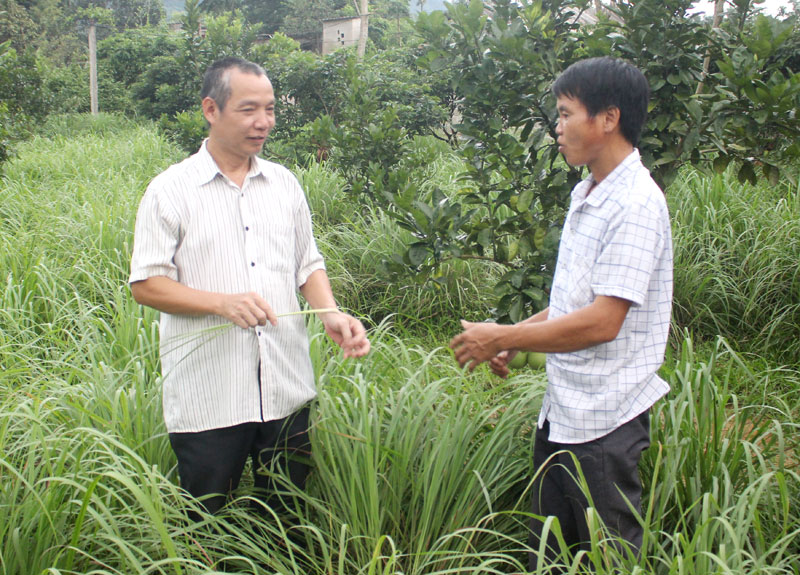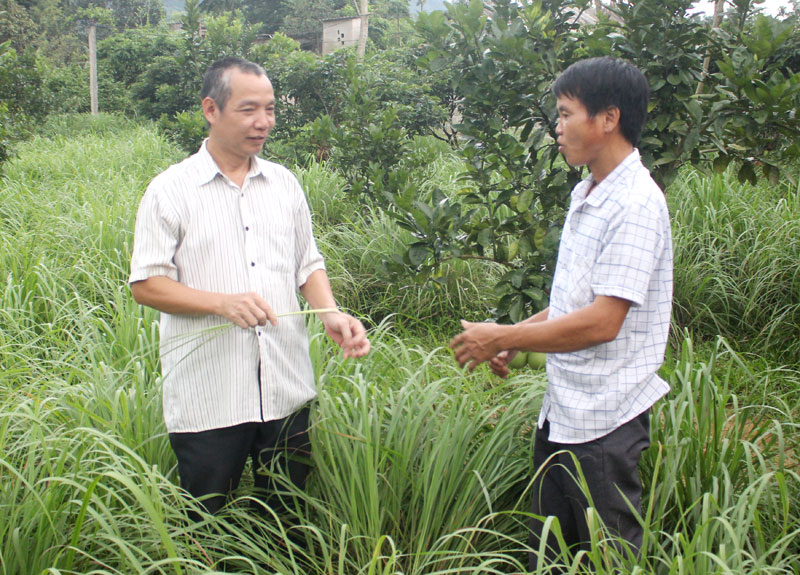
(HBO) - Secretary of Hung Tien commune’s Party Committee Bui The Vuong, the commune started growing lemongrass in 2003 when a few farmer households in Ba Bi village planted and sold the product on a small scale.
 Leaders of the Huy Chi cooperative in Hung
Tien commune, Hoa
Binh province’s Kim Boi district, discuss ways to improve economic
efficiency of lemongrass growingand processing with local people.
Leaders of the Huy Chi cooperative in Hung
Tien commune, Hoa
Binh province’s Kim Boi district, discuss ways to improve economic
efficiency of lemongrass growingand processing with local people.
In 2015, after a trader came to install a lemongrass
essential oil extraction machine, local villagers had soon realised
the potential of lemongrass business, which generates revenue five times higher
than rice farming on the same area. So the villagers began expanding the
plant’s growing areas.
The commune has so far cultivated 80 hectares of
lemongrass across four out of its five villages but it still can not supply
enough for the market.
In early 2018, the commune’s Party Committee and People’s
Committee decided to make lemongrass one of the local key agricultural products
and provided over 40 million VND in financial support for 34 lemongrass growers
to scale up their production.
The Huy Chi cooperative was founded three years ago. It
started to cooperate with the villagers, helping them bring lemongrass
essential oil to the market. Many local farmer households
have escaped from poverty and even gotten rich from the lemongrass.
Local authorities and the cooperative have also made
lemongrass products and lemongrass essential oil the main product of the
nationwide programme "One Commune, One Product” (OCOP) between 2018 – 2020.
Lemongrass is a drought-resistant and pest-resistant
plant adaptable to grow in low hills, according to Bui Van Thong, a farmer from
Ba Bi village. The first harvest can be obtained after six months of cultivation, and farmers can harvest two crops per year, he explained. The lemongrass needs to
be replanted after three years.
The average output is 20 tonnes of lemongrass stalksand 10 tonnes of lemongrass leaves per hectare per crop, he said, adding his
family earns a profit of about 75 – 80 million VND from growing the plant.
He
said his family and others in the village grow lemongrass not only
on seperate fields but also together with citrus fruits following intercropping
method.
The expansion of lemongrass areas coupled with
improvement in productivity and profit from the lemongrass farming have been a
new way of developing agriculture in Hung Tien, helping local
people escape from poverty. To date, the commune’s poverty rate dropped to 18.5 percent with all lemongrass households lifted from the poverty
list.
According to data from the Hoa Binh Provincial Party Committee, the industrial production index for the first six months of 2025 is estimated to have increased by 20% compared to the same period last year. This marks the highest year-on-year growth rate for this period since 2020.
In the first six months of 2025, Hoa Binh province’s export turnover was estimated at 1.145 billion USD, marking an 18.11% increase compared to the same period in 2024. Import turnover was estimated at $ 804 million, a 17.15% increase, which helped the province maintain a positive trade balance.
The lives of the ethnic minority farmers in Tan Lac district have gradually improved thanks to the new directions in agricultural production. This is a testament to the collective strength fostered through the professional associations and groups implemented by various levels of the district’s Farmers’ Union.
With the motto the "product quality comes first,” after nearly one year of establishment and operation, Muong village’s Clean Food Agricultural and Commercial Cooperative, located in Cau Hamlet, Hung Son Commune (Kim Boi district), has launched reputable, high-quality agricultural products to the market that are well-received by consumers. The products such as Muong village’s pork sausage, salt-cured chicken, and salt-cured pork hocks have gradually carved out a place in the market and they are on the path to obtaining the OCOP certification.
In the past, the phrase "bumper harvest, rock-bottom prices" was a familiar refrain for Vietnamese farmers engaged in fragmented, small-scale agriculture. But today, a new spirit is emerging across rural areas of Hoa Binh province - one of collaboration, organisation, and collective economic models that provide a stable foundation for production.
Maintaining growing area codes and packing facility codes in accordance with regulations is a mandatory requirement for agricultural products to be eligible for export. Recently, the Department of Agriculture and Environment of Hoa Binh province has intensified technical supervision of designated farming areas and packing facilities to safeguard the "green passport" that enables its products to access international markets.



 Leaders of the Huy Chi cooperative in Hung
Tien commune, Hoa
Binh province’s Kim Boi district, discuss ways to improve economic
efficiency of lemongrass growingand processing with local people.
Leaders of the Huy Chi cooperative in Hung
Tien commune, Hoa
Binh province’s Kim Boi district, discuss ways to improve economic
efficiency of lemongrass growingand processing with local people.